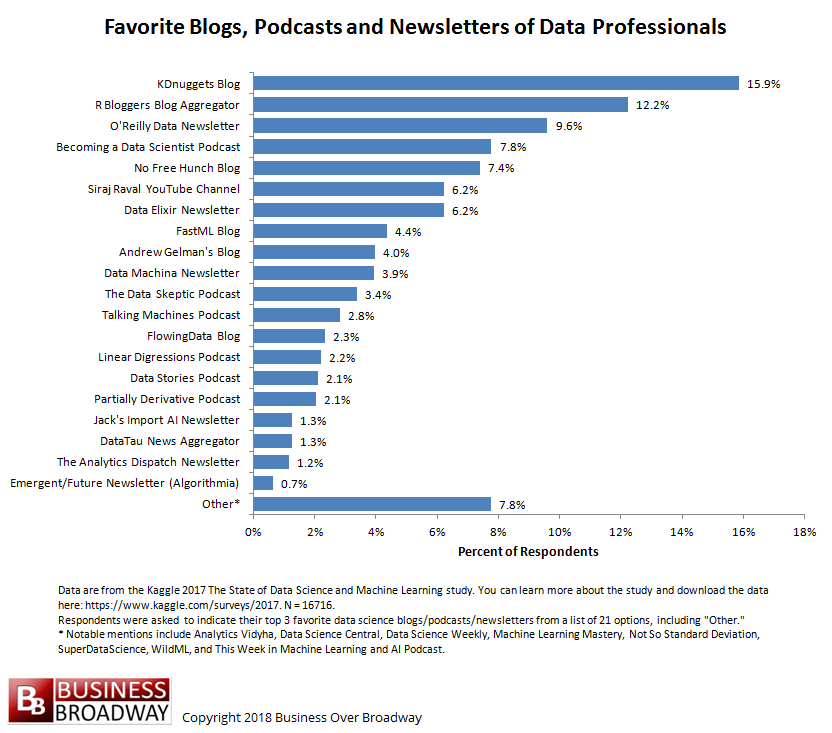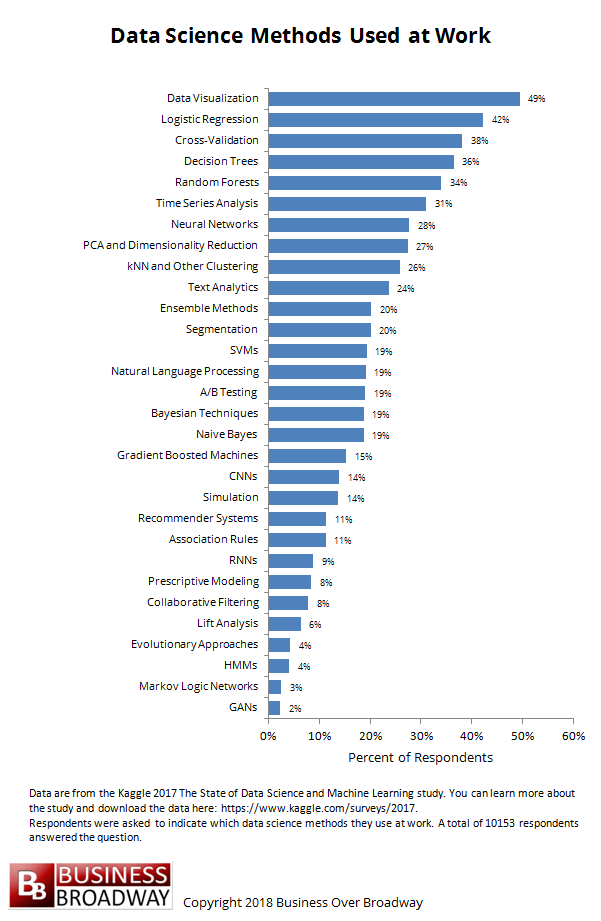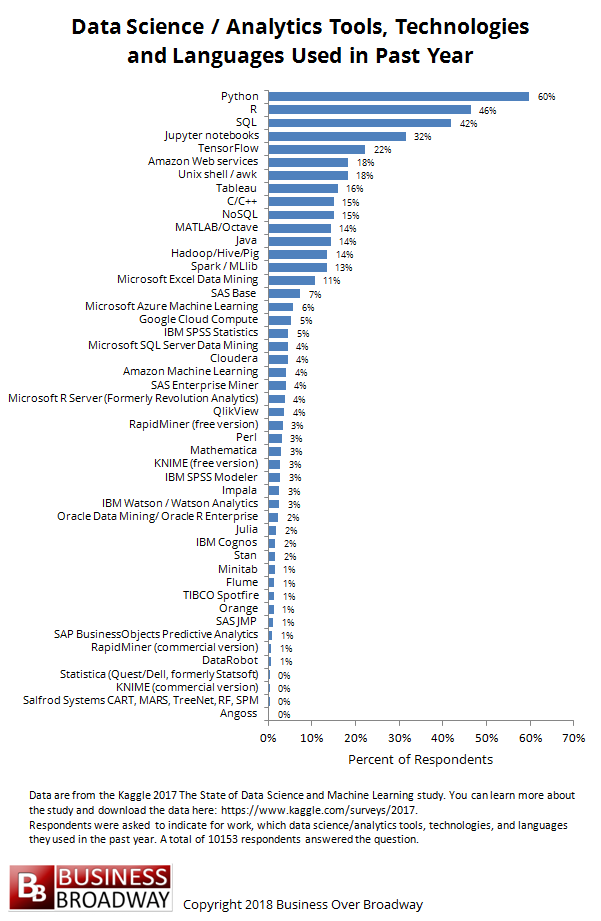The importance of data science and machine learning continues to grow in business and beyond. I did my part this year to spread interest in data science to more people. All of my top blog posts of 2018 (most reads) are all related to data science, with posts that address the practice of data science, artificial intelligence and machine learning tools and methods that are commonly used and even a post on the problems with the Net Promoter Score claims. Below are my top 10 blog posts of 2018:
10. Favorite Data Science and Machine Learning Blogs, Podcasts and Newsletters – In a worldwide survey, over 16,000 data professionals were asked to indicate their favorite data science blogs, podcasts and newsletters. The top two favorite blogs were KDNuggets and R Bloggers. The top two podcasts were Becoming a Data Scientist and The Data Skeptic. The top two newsletters were O’Reilly Data and Data Elixir.
9. Using Predictive Analytics and Artificial Intelligence to Improve Customer Loyalty – As users/customers engage with a company (their products, services, surveys), they generate a lot of data about their behaviors and interactions with the brand. Predictive analytics and artificial intelligence capabilities provide a way to extract insights from that data to help you improve the customer experience and optimize customer loyalty.
8. Which Data Science Tools are Used Together – Analysis of usage of 48 data science tools by over 10,000 data professionals showed that data science tools could be grouped into a smaller set (specifically, 14 tool groupings). That is, some data science tools tend to be used together apart from other data science tools. Implications for vendors and data professionals are discussed.
7. Top 10 Platforms and Resources to Learn Data Science Skills – Data professionals have access to a variety of platforms and resources to continue learning data science skills. While data professionals used around three (3) platforms, no single platform was used by more than 40% of the data professionals. Popular platforms included Kaggle, Online courses and Stack Overflow. Platforms that were rated as most useful included Personal Projects, Online courses and Stack Overflow Q&A. Whether you are an aspiring or seasoned data professional, continuing to learn new data science skills is essential to staying relevant (being employed).
6. Top Machine Learning and Data Science Methods Used at Work – The practice of data science requires the use algorithms and data science methods to help data professionals extract insights and value from data. A recent survey by Kaggle revealed that data professionals used data visualization, logistic regression, cross-validation and decision trees more than other data science methods in 2017. Looking ahead to 2018, data professionals are most interested in learning deep learning (41%).
5. Data Science Reveals Three Problems with the Net Promoter Dogma – By applying data science principles to understanding the research behind the NPS, we see that the NPS claims have three serious problems. First, the “research” behind the NPS claims is flawed. Second, the calculation of the metric (a difference score) results in an ambiguous score that is difficult to interpret. Third, the NPS is insufficient in measuring the multidimensional nature of customer loyalty. Research using data science principles shows that 1) other loyalty questions (e.g., “satisfaction,” “buy again”) are just as good as the “recommend” question in predicting growth, 2) mean scores or top box scores are better than net scores in summarizing data and 3) you need to ask about other types of customer loyalty (e.g., retention, expand usage) that extend beyond just recommendations.
4. Salaries of Data Scientists and Machine Learning Engineers from Around the World – Annual salaries for data scientists and machine learning engineers vary significantly across the world. Countries with the highest paid data scientists and machine learning engineers (in USD) were: US ($120K), Australia ($111K), Israel ($88K), Canada ($81K) and Germany ($80K). Countries with the lowest annual salaries were: Brazil ($35K), Poland ($29K), Ukraine ($25K), India ($14K) and Russia ($13K).
3. A Majority of Data Scientists Lack Competency in Advanced Machine Learning Areas and Techniques – Data science requires the effective application of skills in a variety of machine learning areas and techniques. A recent survey, however, revealed that a limited number of data professionals possess competency in advanced machine learning skills. About half of data professionals said they were competent in supervised machine learning (49%) and logistic regression (53%). Deep learning techniques were among the ML skills with the lowest competency rates: Neural Networks – GAN (7%); NN – RNNs (15%) and NN – CNNs (26%).
2. Top 10 Challenges to Practicing Data Science at Work – A survey of over 16,000 data professionals showed that the most common challenges to data science included dirty data (36%), lack of data science talent (30%) and lack of management support (27%). Also, data professionals reported experiencing around three challenges in the previous year. A principal component analysis of the 20 challenges studied showed that challenges can be grouped into five categories.
1. Most Used Data Science Tools and Technology in 2017 and What to Expect for 2018 – The practice of data science requires the use of analytics tools, technologies and languages to help data professionals extract insights and value from data. A recent survey revealed that data professionals relied on Python, R and SQL more than other tools in 2017. Looking ahead to 2018, the survey results showed that data professionals are most interested in learning Tensorflow, Python and R.
In 2019, I am continuing my research on the practice of data science to help companies get the most value from their data. If you want to keep up with my latest thinking on these topics and more, be sure to subscribe to my newsletter.







 Beyond the Ultimate Question
Beyond the Ultimate Question Measuring Customer Satisfaction and Loyalty (3rd Ed.)
Measuring Customer Satisfaction and Loyalty (3rd Ed.)
Comments are closed.